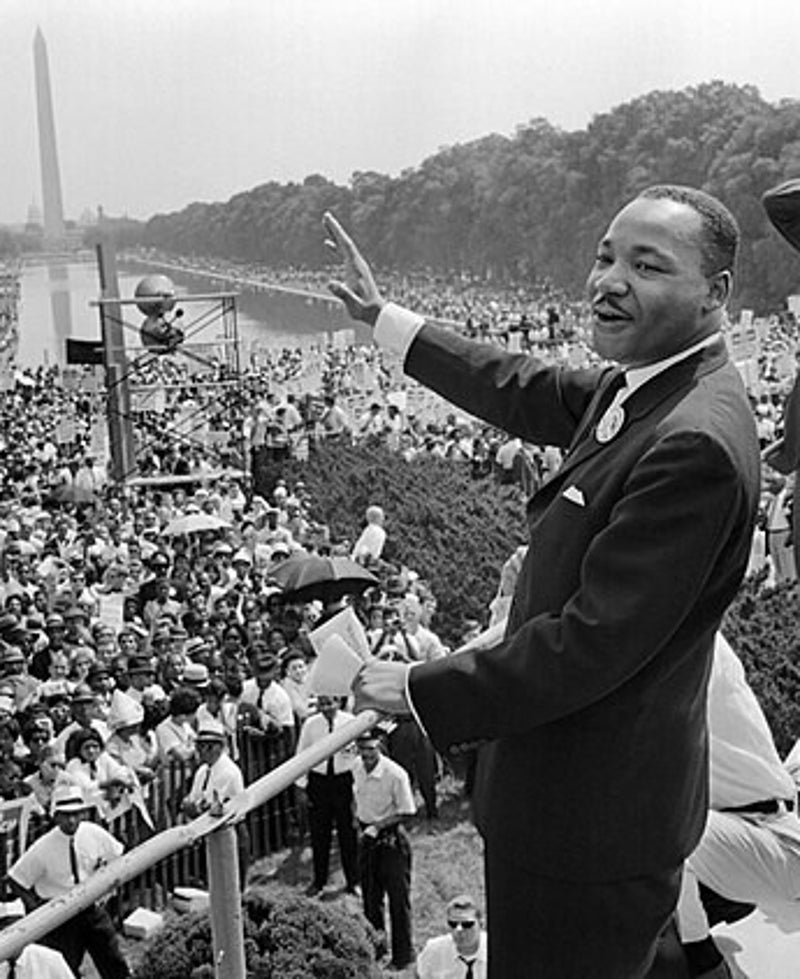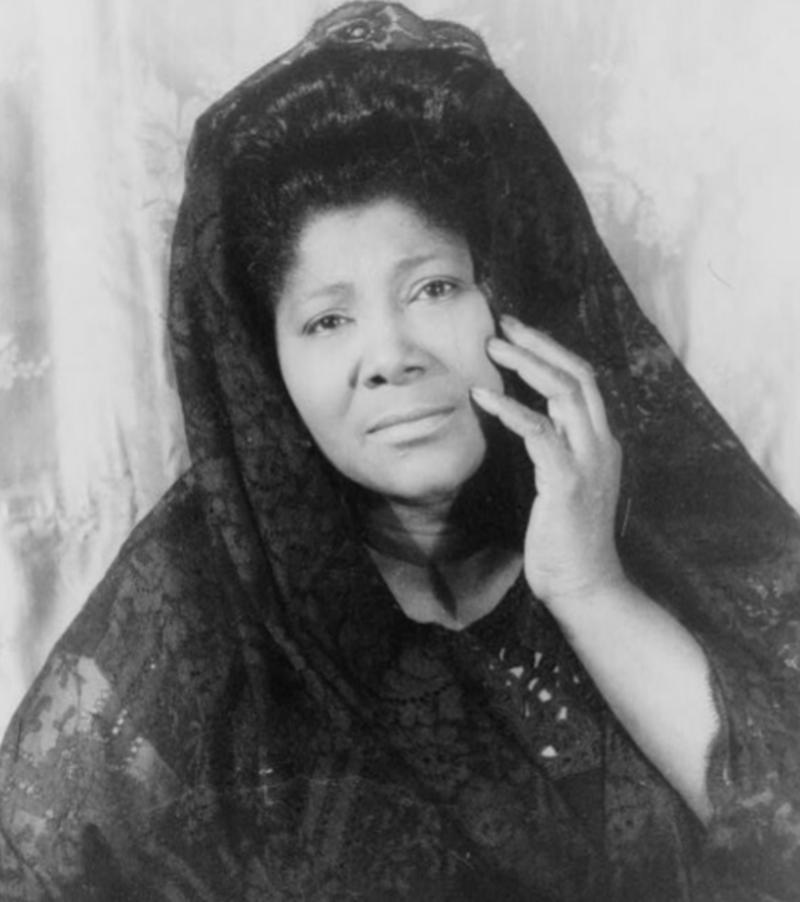Mahalia Jackson, known as the “Queen of Gospel,” was one of the most influential singers of the 20th century. But her story is much more than her incredible voice—it’s a testimony of faith, perseverance, and purpose rooted in a deep love for God.

Photo via Wikimedia Commons / Public Domain
Early Life and Childhood
Mahalia was born on October 26, 1911, in New Orleans, Louisiana, into a very humble and challenging environment. She was the youngest of eight children and grew up in extreme poverty in a small three-room house shared by thirteen family members. When Mahalia was just five years old, her mother passed away, leaving the family without a maternal figure.
Shortly after, Mahalia was sent to live with her aunt, who was strict and forbade the children from singing, dancing, or enjoying any form of play. Yet Mahalia’s spirit was unquenchable. She found solace and joy in the church, where she would sneak away to sing spirituals and hymns.
“I never forget, I used to stand before that choir and cry like a baby. I just wanted to sing for the Lord.”
Despite no formal training and a difficult upbringing, Mahalia’s natural talent and passion for gospel music began to blossom through the nurturing environment of the Black church.
Mahalia Jackson – “How Great Thou Art”
Mahalia pours out pure worship in this timeless hymn, reminding us that true greatness belongs to God alone.
Rising Through the Gospel World
In her early twenties, Mahalia moved to Chicago, a city bustling with opportunities for gospel music during the Great Migration. She joined the Greater Salem Baptist Church and quickly became known for her powerful, soulful voice. Mahalia’s singing wasn’t just about entertainment—it was worship, ministry, and a message of hope.
The 1940s brought Mahalia to national attention. She recorded the song “Move On Up a Little Higher” in 1947, a gospel anthem that sold over 8 million copies and broke sales records. This song didn’t just mark a commercial success; it broke barriers for gospel music to enter mainstream markets, opening doors for Black gospel artists across the country.
Even with offers to sing secular music genres like blues and jazz, Mahalia steadfastly refused, insisting on singing gospel alone.
“With the blues, when you finish, you still have the blues. But with gospel—when you finish—you have hope.”
Her dedication to gospel music defined her career and her legacy.

Photo via Wikimedia Commons / Public Domain
Mahalia Jackson & Dr. Martin Luther King Jr. (Rare Footage)
More than friends—these two were partners in purpose, using their voices for faith and freedom.

Photo via Wikimedia Commons / Public Domain

Photo via Wikimedia Commons / Public Domain
Faith in Action: Civil Rights and Ministry
Mahalia’s influence stretched far beyond the music world. In the 1950s and 1960s, during the height of the civil rights movement, she used her voice to inspire courage and faith.
She was a close friend and spiritual encourager to Dr. Martin Luther King Jr. and performed at many civil rights rallies, including the historic 1963 March on Washington. Just before Dr. King delivered his famous “I Have a Dream” speech, Mahalia sang “I’ve Been ‘Buked and I’ve Been Scorned,” touching hearts with the depth of her song.
She famously called out to Dr. King during the speech, shouting,
“Tell them about the dream, Martin!”
— which prompted him to deliver the most iconic lines of the address.
Mahalia’s role in the movement was not just as an entertainer but as a spiritual warrior, using worship as a form of protest and hope.
Mahalia Jackson – “How I Got Over” (March on Washington, 1963)
Moments before Dr. King’s “I Have a Dream” speech, Mahalia sang this soul-stirring anthem of survival and praise.
Personal Trials and Perseverance
Mahalia’s journey was not without hardship. She endured deep personal losses, including two failed marriages, chronic health issues like sarcoidosis and heart problems, and the constant weight of racism and poverty.
At times, she was so ill she could barely walk, yet she continued to sing and minister, drawing strength from her faith in God.
“My songs are my prayers. When I sing, I feel God's Spirit come over me.”
Her story is a reminder that God can use our weaknesses, pain, and brokenness to bring healing and hope—not only to ourselves but to others as well.
Legacy and Passing
Mahalia Jackson passed away on January 27, 1972, after a lifetime of singing gospel music and ministering through song. Her funeral was a massive public event, attended by over 50,000 people in Chicago alone, and her impact continues to echo in the gospel world and beyond.
Though she had no biological children, Mahalia’s spiritual motherhood and influence touched generations. Her recordings remain timeless, her example of faithfulness still inspires, and her voice still moves hearts.

Photo via Wikimedia Commons / Public Domain

Photo via Wikimedia Commons / Public Domain
Dr. Martin Luther King Jr. - “I Have a Dream” Speech (Full)
One of—if not the—most powerful speeches in American history, spoken with clarity, conviction, and a dream that still calls us higher.

By Carl Van Vechten - Van Vechten Collection at Library of Congress, Public Domain
How Women Today Can Relate to Mahalia Jackson
-
Faithfulness in Trials: Like Mahalia, many women face personal hardships but are called to keep walking in faith and worship through it all.
-
Standing Firm in Convictions: In a culture that often pressures compromise, Mahalia’s life encourages women to stay true to their values and calling.
-
Using Your Voice: Whether through singing, teaching, nurturing, or advocacy, every woman has a unique voice God wants to use.
-
Living Humbly: Despite fame and success, Mahalia remained humble, reminding us that true influence comes from a surrendered heart.
-
Courage to Lead: Mahalia’s role in the civil rights movement shows that women’s faithful leadership can change history.
Reflection Questions
-
What gifts or passions has God given you that you might be hesitant to fully embrace or share?
-
How do you respond when your faith is challenged or unpopular?
-
In what ways can you use your voice—whether spoken, written, or sung—to encourage or stand up for others?
-
How can worship become a source of strength during your struggles?
-
Who are the women in your life that inspire you to live faithfully, and how can you encourage others in return?
Please respond in the comments below — I’d love to hear your thoughts and stories!
Lord God,
Thank You for the example of Mahalia Jackson—a woman who sang boldly, lived faithfully, and loved deeply.
Help us to walk in her footsteps, trusting You in the hard seasons, using our voices for Your glory, and standing firm in our convictions.
Fill our hearts with courage when we face trials, and remind us that our faithfulness matters—even when no one is watching.
May our lives be a song of worship and hope that draws others closer to You.
In Jesus’ name, Amen.
Add comment
Comments
I will tell you now. All of these things. The whole civil rights and BEFORE I lived through and remembere WELL. As a very young child growing up in the deep south, of which I am very proud of. My English roots go back to the 1400's. Before the first THANKSGIVING. My ancestors settled N.C. and V.A. This is not ANCESTRY. This is passed down info along with documentation through the generations. Then I'm CHEROKEE. I say this to say...those people those men and women, Mrs Jackson, Dr King are my heroes. Unlike today....these amazing people...they had TRUE COURAGE. Unlike I have NEVER seen before or since. Faith in The Lord. So strong. I like to think I'm as strong as Mrs. Jackson. But am I really? He voice gave me chills and I wanted to drop to my knees when I would watch her sing. Unbelievable. My daddy when I was so young would try to explain things to his young daughter. Who was precoshise and asked loads of questions all the time. Finally one day I said "Daddy. Those other people are just pure mean! " Yes Katherine. They are." I just don't feel that your people are able to fully understand these courage people unless you we there. Nothing. Nothing like today. Sad.
Thank you so much for sharing your story and honoring those who lived with such strength and conviction. Your words carry deep weight, and I’m grateful for your perspective. You lived through a time that shaped history, and voices like yours help keep that truth alive. I agree—there’s a kind of courage that was forged in faith and fire back then, and it still inspires today.